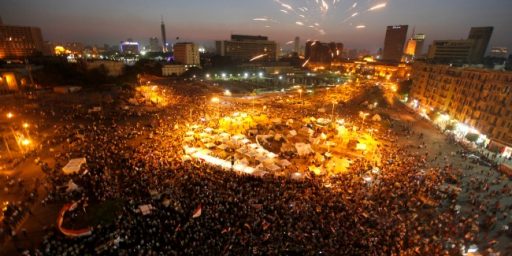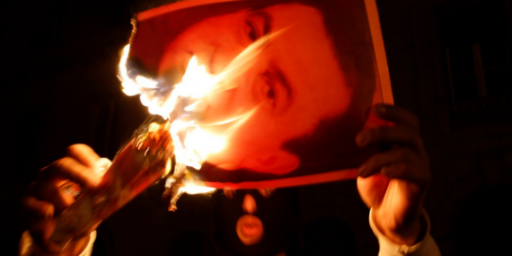Did The Egyptian Military Set Morsi Up To Fail?
Certain aspects of Egyptian civic life have improved rapidly in the wake of the military coup, raising at least some questions about the events leading up to it.
Kevin Drum points to a report in The New York Times that notes rather sudden changes in Egypt in the wake of the downfall of the Morsi regime that arguably put last week’s coup, and the events that led up to it, in a very different light:
CAIRO — The streets seethe with protests and government ministers are on the run or in jail, but since the military ousted President Mohamed Morsi, life has somehow gotten better for many people across Egypt: Gas lines have disappeared, power cuts have stopped and the police have returned to the street.
The apparently miraculous end to the crippling energy shortages, and the re-emergence of the police, seems to show that the legions of personnel left in place after former President Hosni Mubarak was ousted in 2011 played a significant role — intentionally or not — in undermining the overall quality of life under the Islamist administration of Mr. Morsi.
And as the interim government struggles to unite a divided nation, the Muslim Brotherhood and Mr. Morsi’s supporters say the sudden turnaround proves that their opponents conspired to make Mr. Morsi fail. Not only did police officers seem to disappear, but the state agencies responsible for providing electricity and ensuring gas supplies failed so fundamentally that gas lines and rolling blackouts fed widespread anger and frustration.
“This was preparing for the coup,” said Naser el-Farash, who served as the spokesman for the Ministry of Supply and Internal Trade under Mr. Morsi. “Different circles in the state, from the storage facilities to the cars that transport petrol products to the gas stations, all participated in creating the crisis.”
Working behind the scenes, members of the old establishment, some of them close to Mr. Mubarak and the country’s top generals, also helped finance, advise and organize those determined to topple the Islamist leadership, including Naguib Sawiris, a billionaire and an outspoken foe of the Brotherhood; Tahani El-Gebali, a former judge on the Supreme Constitutional Court who is close to the ruling generals; and Shawki al-Sayed, a legal adviser to Ahmed Shafik, Mr. Mubarak’s last prime minister, who lost the presidential race to Mr. Morsi.
But it is the police returning to the streets that offers the most blatant sign that the institutions once loyal to Mr. Mubarak held back while Mr. Morsi was in power. Throughout his one-year tenure, Mr. Morsi struggled to appease the police, even alienating his own supporters rather than trying to overhaul the Interior Ministry. But as crime increased and traffic clogged roads — undermining not only the quality of life, but the economy — the police refused to deploy fully.
Until now.
White-clad officers have returned to Cairo’s streets, and security forces — widely despised before and after the revolution — intervened with tear gas and shotguns against Islamists during widespread street clashes last week, leading anti-Morsi rioters to laud them as heroes. Posters have gone up around town showing a police officer surrounded by smiling children over the words “Your security is our mission, your safety our goal.”
“You had officers and individuals who were working under a specific policy that was against Islamic extremists and Islamists in general,” said Ihab Youssef, a retired police officer who runs a professional association for the security forces. “Then all of a sudden the regime flips and there is an Islamic regime ruling. They could never psychologically accept that.”
Now, granted, much of this could obviously be sour grapes on the part of the Muslim Brotherhood and a desire to ascribe the forces that led to the popular uprising that led to his ouster as something that sprang to life thanks at least in part to an active campaign by loyalists to Mubarak and, more importantly, the military, inside the government who engaged in activities designed to undermine Morsi’s rule. After all, it feeds into the Brotherhood’s own ideology and helps to create a narrative of victim hood that is likely to serve them well in the coming years if they choose to become active opponents of the new government rather than trying to find a way to become a part of Egyptian civil society. Additionally, it prevents them from having to recognize the rather obvious faults of the Morsi regime, ranging from his failure to revive the Egyptian economy, to his turn away from any kind of democratic pluralism and toward a full-on advocate for the Muslim Brotherhood’s platform, to his assumption of near dictatorial powers last November over the objections of nearly every segment of Egyptian society. It’s much easier for them to claim a vast conspiracy against them than to admit their own obvious failings.
While the sudden turnaround on the streets of Egypt may seem suspicious, there are other perfectly logical explanations for what may be happening. Businesses tend not to be very productive when the political situation is unstable or when the political leadership is acting in a manner that seems to indicate that they don’t know how to effectively lead the country. Once that regime is wiped away, it’s not necessarily surprising that things would start turning around quickly. Additionally, for better or worse, the Egyptian military does seem to inspire in the people a sense of stability and order that is also conducive to the normal functioning of the economy and the rapid changes in the country since the coup could easily be attributable to an alleviation of the sense of uncertainty that had been gripping the country.
At the same time, though, there are some suspicious things. The unwillingness of the Interior Ministry, and namely the police, to cooperate with Morsi during his rule and their rapid return to the streets subsequent to his downfall certainly does raise an eyebrow. Whether that was part of some active conspiracy by the military, though, or just an independent decision by a Ministry that was still staffed largely with Mubarak loyalists, is a completely different question. In some sense, though, Drum is correct. If this is true, then it does tend to cast the coup and the events leading up to it in a very different light.


![Military Coup Underway In Egypt [Update: Morsi Deposed]](https://otb.cachefly.net/wp-content/uploads/2011/02/egypt-flag3-512x256.gif)




Morsi and the Muslim Brotherhood attempted to impose an Islamist regime on a people who weren’t interested in Islamism. Plus, the Islamist agenda is so impossible that it’s self-defeating, even more so than Communism, so the downfall was inevitable.
If the military helped grease the skids, I’m cool with that. If they did, they didn’t change a damned thing, they just bumped the time table a little. And good for them.
Absolutely. We had the chance to fix that problem here in the US in 2012, but instead we reelected Obama.
@Jenos Idanian:
No, wrong. Roughly 70% of the Egyptian people voted for Islamist parties in a free election. IIRC half voted for the Brotherhood – an organization well known to Egyptians.
The people are poor, poorly educated, raised on conspiracy theories and religion — much like many Republicans. They are not liberals. Their version of freedom isn’t yours or mine.
@Dave: Absolutely. We had the chance to fix that problem here in the US in 2012, but instead we reelected
Obama.a Republican House of Representatives that continues to hold the country hostage for a set of ideals that were found to be absolute hogwash over a hundred years ago.See how easy that was?
@Dave:
So that’s why the deficit is rising and the economy went back into recession.
Oh, wait, sorry, checking the facts: seems last time we had one of your guys we had economic meltdown. Then we hired Obama and things have been improving ever since. Lower deficits, lower trade deficits, record stock market, no inflation or deflation, huge corporate profits, and slowly improving job market.
I guess you just got confused.
This just in, government workers suspected of letting their personal political feelings impact how they do their job, what level of competence they exhibit and who they harass. Film at Obama headquarters.
@michael reynolds: Yes, the Brotherhood won the election. And promptly started trashing all their promises and commitments.
I don’t know why you’re pushing so hard in favor of a “one man, one vote, one time” move, and I sure as hell don’t understand why you are defending the Muslim Brotherhood. Their name says it all — if you aren’t a Muslim brother, you don’t count. To them, women are chattel, non-Muslims are serfs, Jews are “sons of apes and pigs,” and gays need to be killed.
And that’s just some of their nicer qualities.
Doug seems to think the rapid return to something like normalcy raises suspicions of military manipulations. I see it, rather, as evidence that passive resistance to Morsi extended across many Egyptian institutions, and support for the idea that the military ultimately acted in support of a popular uprising.
@Jenos Idanian:
So I point out that you don’t know what you’re talking about and you come back with the notion that I’m supporting one man, one vote, one time? Because what, I’m a Muslim Brotherhood supporter? An American Jew supporting the MB? Right.
I was just stating facts. I understand that your crowd dislikes fact. But some of us continue to believe they are useful.
Really, dude, think for a minute before you start typing. And in cases where you don’t know anything, don’t type at all.
@michael reynolds: Because what, I’m a Muslim Brotherhood supporter? An American Jew supporting the MB? Right.
In a world where “Gays For Palestine” exist, it’s not exactly unheard of.
And you’re sounding a LOT like the Hang Zimmerman crowd. Take an issue, strip it of all context and nuance and fact that doesn’t support one side, and present that as an absolute truth.
The Muslim Brotherhood won an election, and was removed in power with a large helping hand from the military. Yes. All true. But there was a hell of a lot more that shows that the military here was helping advance freedom and democracy, and reductio ad absurdum tactics show a simple-minded absolutism that I thought you were above.
Yes, I’ve called you a psychotic hate-monger, but you aren’t stupid.
@Mattt:
Correct, though it’s important to note that these were largely elite institutions of power.
Which does get to Michael’s point. This was, in many respects a technocrat led coup — the people who felt they had the most to lose from the electoral decisions of the “unwashed” masses, who elected a largely conservative government.
And chances are those technocrats were correct.
It also needs to be noted that the coup fits into a larger “proxy” war going on between a number of gulf states with Saudi Arabia on one side and Quatar on the other. The fact that Saudi Arabia convinced a number of other countries to help starve the Morsi government by cutting off support aide cannot be overlooked in the larger analysis.
@Jenos Idanian:
Pot, meet kettle.
BTW, for the sake of our keyboards, monitors, tablets, and smart phones, please warn us before writing stuff like this. That way we can be sure to swallow whatever it is we are drinking in order to avoid the involuntary spit take.
@michael reynolds: Yes, two thirds of the vote was for Islamist parties. As with much of the US, you have an educated urban minority, but most of the country is Egyptucky. As others have observed – Egypt can have a secular government or they can have democracy, but they probably can’t have both.
Greetings:
You’re such an Islamphobe. The Allah-dude did it. Insallah baby, Insallah. How could a military whatever do something that the Allah-dude didn’t want done, done well, and done quickly. Quit trying to undermine the Religion of Peace since 632 A.D. (Can I say A.D. or should that be Year 1 ???) It’s time to do your Shahada. You get extra Peace for doing it during Rama-lama-ding-dan. Kind of like killing a Copt.
Forward !!!
The size of the protests would have been smaller without this passive resistance from the Interior Ministry, but there still would have been protests. Probably not enough to lead to a coup.
I don’t know, I doubt there was actual conspiracy at work. More likely the army saw an opportune situation and acted. But there probably wouldn’t have been enough opportunity without pro-Mubarak bureaucrats slowing down to a crawl in the workings of government.
Since I dislike Republicans for doing the same thing here, I don’t see why I should find them any better for it. I don’t like Islamism and Morsi and the Brotherhood overplayed their hand, but procrastinating in your civic duties in order to engineer a coup is worse.
@ Jenos
Wow.
Evil Muslims, Zimmermann, & communism, all in one thread. It’s a big day for you.
@anjin-san: Tell you what, I’ll go for the Triple Lindy:
Islamism is proving itself utterly incompatible with elective democracy, alongside Communism, Nazism, and other forms of fascism.
And it’s too bad there isn’t a Zimmerman thread going on, because some really remarkable things have been happening there. Just this morning, the prosecution tried to… well, never mind. As always, Legal Insurrection is the go-to place for actual coverage.
@ Jenos
♪♫♪
Stand by your man
♫♪♫
@Jenos Idanian #13:
You keep writing stuff like this and we keep reminding you that many democratic countries have active *Communist* parties whose members are democratically elected to their local, regional, and national governing bodies.
Also depending on how you are defining Islamism, there are a number of countries including Turkey and Indonesia that could contradict that statement.
BTW, its statements like the on above that makes it all the better that earlier in the thread you wrote the following:
@Jenos Idanian:
Let’s see, you just took an issue, (a) stripped it of context that didn’t support your side, (b) stripped it of nuance that didn’t support your side, and (c) presented it as absolute truth.
And all within, what, 8 posts and approximately 2 1/2 hours of talking down to another poster for doing what you saw as the exact same thing. That’s got to be a record.
@Jenos Idanian #13:
Yes, we get that you really want to talk about Zimmerman but we were talking about Egypt, a topic about which some of us know a very little and you, nothing.
@anjin-san: At least I make a gesture towards the topic at hand. You, however, just stalk me thread to thread, never addressing the topic, just talking about me.
I should probably check my pigtails for ink-stains next…
Here’s something for you Jenos – put it up next to the George Zimmermann pinup photos in your bedroom:
Treyvon Martin’s Dead Body